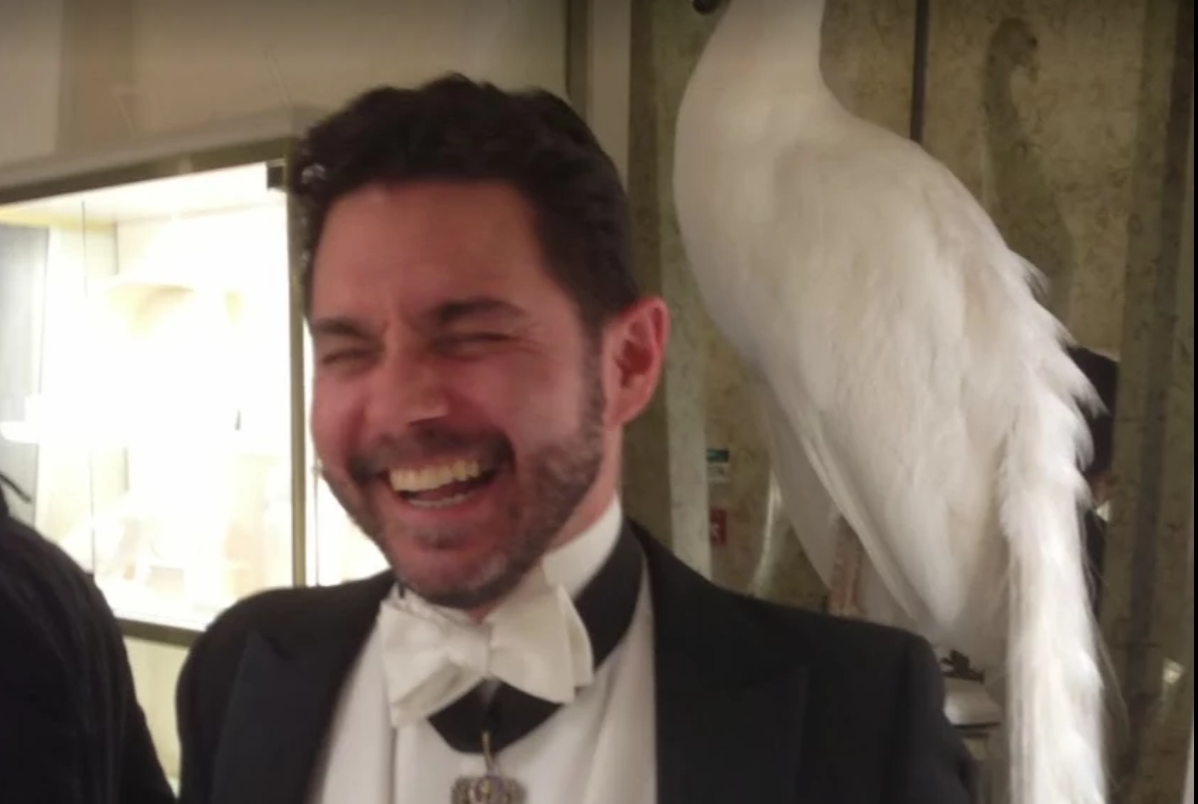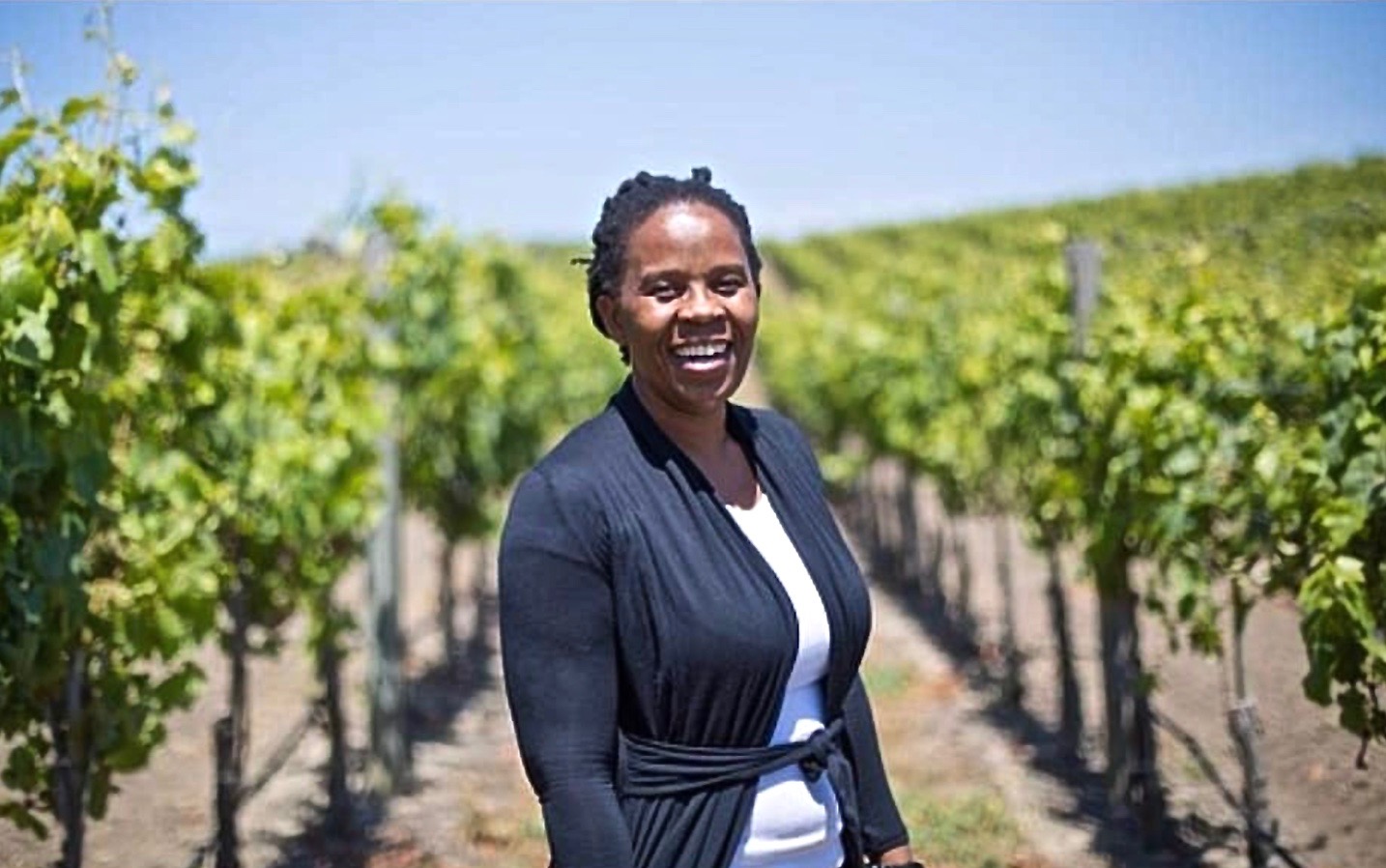
Every now and then you get an invitation to do something you just can’t say no to. The chance to interview the award winning Ntsiki Biyela of Aslina Wines, who has the distinction of being the first black woman winemaker in South Africa, was just such a situation: irresistible. How could anyone pass up that privilege?
Here are her inspiring words about winemaking, and life.
Edward Marchese: Ntsiki, can you tell us a little bit about yourself?
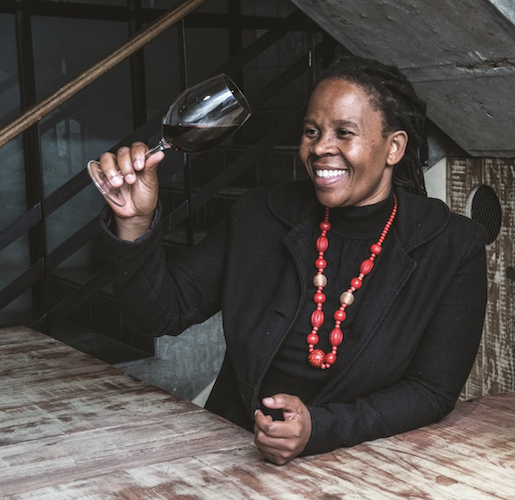
Ntsiki Biyela: Sure. I never know where to start when I have to talk about myself. But I'm from South Africa, Kwazulu-Natal, which is one of the provinces more northeast of South Africa but more inland and from the rural areas of Kwazulu-Natal. And I'm based now in the Western Cape, which is in the wine area, but I came to the wine region long before I even knew what wine was. It was basically through a scholarship from South African Airways to study winemaking. And when they said, "Are you going to study winemaking?" I was like, "Oh, sure. I'll do that." I had no idea what they were talking about. I heard the word study, and then I was like, "I'll do it." And they go, "Oh, it's in Afrikaans, by the way." And I was like, "Oh that's fine. I'll learn." And I still didn't understand what that meant.
(Photo: Winemaker Ntsiki Biyela)
So, when I got to Stellenbosch, I realized, "Oh my word, this is what they meant." So it was basically, yeah, not only like a change of culture, but the difficult, and the difficulty of the language and not understanding. It's like on top of not knowing what you're coming to study, you've never seen it, you've never tasted the wine, you don't know what they're talking about, and on top of it you've got the language issue. Yes, so there's culture, there's language, and there's just the whole understanding of being detached there.
So when did you come to love wine and want to make it?
So what happened was, because I was studying something that I didn't even know what it was, I then got myself a job at one of the wineries, Delheim Wines, in Stellenbosch. Work there helped me actually to know what wine was. But before even going there, the guy who had recruited us from high school gave us the wine to taste. It was like "Okay, you're going to be studying winemaking, you have to taste this wine.” So they poured this red liquid in a glass, and I'm not even sure what wine it was at that point, but I remember him explaining about the plums.
You know when someone is explaining something they like, they tell you how beautiful it is, and then you're thinking, "Can you just shut up so that I can taste this? This is going to be delicious!” And then you take a sip and you realize this is the most horrible thing you've ever had in your life. And then he goes, "So what do you think?" And they're like, "It's nice.”
And then the following question is like, "Do people really drink this?" You know, so there was one of those. But working at Delheim then helped me to actually just ... start learning about wine, and enjoying it, and slowly getting to understand it. Interesting enough, the very first one that I really, really said, "Oh I like this,” was a Shiraz. It was a Shiraz 1990, I still remember. And so that what was working at the tasting room was like, because on a weekend we were allowed to take open bottles with us. Being a student, getting good wines to take back to campus, nothing beats that. And then you know, it's like,”We close at four o'clock and it's half past three, or quarter to four, there's a little bit of wine left in one of the bottles that's left, the client will not like to drink something that's so low. So we need to open another bottle,” and then you say to everyone, "That's my bottle!”
That was the beauty of being a student. Funny enough, always when I speak to the managers at Delheim, because I was there, they’re like, "Oh no. We knew all about what you guys were doing then.” They're like, "You're working with students, what do you expect?” So I was like, “Ah, they did know.”
So what's your winemaking philosophy, once you had gotten through that process and go, ”Okay I'm going to make wine now?” Why start doing that on your own?
So I worked for Stellekaya for 13 years, as their winemaker. I was specializing in reds. So I was making their wines. I started in 2004 after graduating at university. So as I was working there, I knew that at some point I wanted to start my own company. It was the matter of when.
Again with the struggles of, you know starting a new business, then your finances, how are you going do this? How are you going to do that? I met with Nia Kabomash in 2011, and she was like, "I've got an idea. Would you like to do a collaboration wine, so that you can introduce your wine in the US?" And I was like, “Sure.”
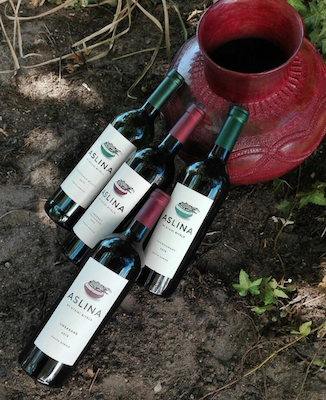
So she made me collaborate with Helen Keplinger, which was a fantastic collaboration that we did for a 2012 vintage, and we did also a 2013 vintage. And then after that on to 2014, I started Aslina. I started the company because, as I said I wanted to start my company, but to come to the name, I thought actually there's nothing better I can do than to honor my grandmother, and name the company after her.
(Photo: A selection of Aslina wines)
That's so nice.
So I named if after her, Aslina, because she played a big role in my life. She's one of those unsung heroes. She's one of those people I would say who could turn five cents and make it 100 grand. So she was one of those, and she was taking care of everybody really. So, yeah, it was about her.
So when did Aslina start?
Basically we launched in 2017. So even though I made some of the wine in, let’s see…. I made the Cabernet in 2014, and then in 2015 I made the Sauvignon Blanc and the blend, Umsasane, and then I launched those three in 2017 into the market.
I always believe in taking it natural. Don't fiddle too much. You want balance but at the same time you need to let nature take care of itself, because nature knows how to take care of itself. We are the ones who like fiddling and interfering, so as winemakers we're there to guide the wine. So we're there to guide it, so that it can get to the bottle and get to the people's tables.
So where is the vineyard for people who don't know the region very well?
We are based in Stellenbosch, but we source the grapes from Stellenbosch, Powell, and Elgin. So sometimes we do buy some from Devinville, but it's all based in the Western Cape, which is the far bottom part of South Africa.
And what varietals do you grow, or do you work with?
I'm working with Cabernet Sauvignon. I'm working with Petit Verdot. I work with Cabernet Franc, which is what I'm using in the blend, and then I'm working with Sauvignon Blanc and Chardonnay.
Tell us a little bit about the blend you're using. It has an unusual name, at least for us Westerners. Can you explain that a little bit?
So the blend I have is called Umsasane. So Umsasane, it is an iconic tree in Africa, it is the acacia tree. The one, the umbrella tree.
Yes. I know that tree.
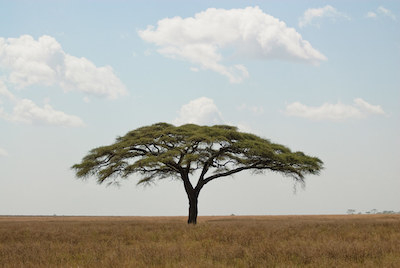 But the reason the name ended up on the bottle, it was my grandmother's nickname, and I think, as I said, what she meant, who she was, it basically fit well with her, because it's what the family see her as, being the anchor, being the protector, being the go-to person, the one who's looking after everyone.
But the reason the name ended up on the bottle, it was my grandmother's nickname, and I think, as I said, what she meant, who she was, it basically fit well with her, because it's what the family see her as, being the anchor, being the protector, being the go-to person, the one who's looking after everyone.
(Photo: An acacia tree in South Africa)
And is she still doing that?
No, she passed on.
I'm sorry.
But at least I always say, she had tasted my wine. And I remember that was one of my best wine moments ever. I remember one of my wines had won a gold medal when I was working at Stellekaya. It was my very first wine. You know, just started as a winemaker, I started in 2004, and then in 2006, my 2004 wine won a gold medal.
Took it home. Said to her, "Oh here's the wine. Taste it. It won a gold medal.” And she was so happy, you know? Took the cups. I poured the wine. And then she tasted it, and she goes, "It's nice,” and then the facial expression. You know when somebody tasted something very sour and then is like, ugh. But she was proud.
Really, really nice. Can you tell us a little bit about the terroir that's there, and how it affects the wine, or what it brings out in the wine?
So, most of the grapes are coming from Stellenbosch, so it's a warm climate region. But even though it's warm climate region, there are pockets of it that are cooler, depending on what slope the vineyard is facing. Especially for the Sauvignon Blanc, I know people always say they like the climate of Sauvignon Blanc. I'm more for warm climate. I want tropical fruit.
So basically I get for my Sauvignon Blanc, that tropical character fruit, because it's in a warm climate region, and I add a little bit of Semillon in it, just to give it that depth.
And then on the red I get that intensity, I get black currants, but you get that more intensity on the Cab.
Are there challenges, given the climate and the temperatures there, for you as a winemaker?
I think after harvesting in France in 2013, and having the most difficult harvest ever, I used to say, "Oh no, this is a difficult harvest in South Africa,” and then I realized, "No I must not say that ever.” Because I think after that harvest, I was like, "Okay, we always say we've got a difficult harvest; we don't." In South African terms, yes; but in real terms of looking globally, no we don't. But I think one the of struggles I had with the 2018 was because of the droughts and the chemical component of the wine, we had struggles in terms of stabilization of the white wines, but it was because of the drought, which we just got out of now, thank goodness. So things are now going accordingly, hopefully.
And what's the production like for you, how many bottles per year?
Okay, we started way back with 1,800 bottles, and now we're doing with the 2017 vintage, which I just bottled, we did 20,000 bottles, but that's the amount of the four wines. So it splits across the board. Currently, it has been more Sauvignon Blanc and Chardonnay, even though the focus ... I've been making red wine for a long time, but the Sauvignon Blanc and the Chardonnay have been the ones that have needed more demand because of the market. Because it goes more by the glass, so, yes.
Can you tell us also a little bit, given where you are, what it has been like to be a black woman making wine in South Africa?
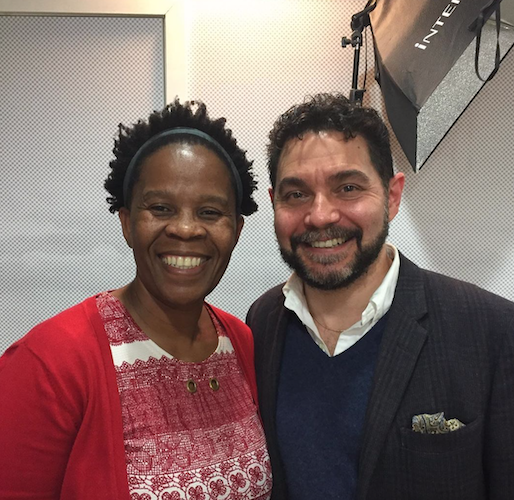 I think for me one of the things that I can say I'm blessed with as a winemaker, well not that I'm good at making friends, but it just happens. So I've built relationships within the industry. So ... there are moments obviously where you go through winemaker seminars, where us winemakers get together and then you're there and you're like, "Where are the other women?" And then I'll tease the guys. I'm like, "Guys, this is not on." They go, "But you're here." And I'm like, "No, I'm here, but where are the others?"
I think for me one of the things that I can say I'm blessed with as a winemaker, well not that I'm good at making friends, but it just happens. So I've built relationships within the industry. So ... there are moments obviously where you go through winemaker seminars, where us winemakers get together and then you're there and you're like, "Where are the other women?" And then I'll tease the guys. I'm like, "Guys, this is not on." They go, "But you're here." And I'm like, "No, I'm here, but where are the others?"
(Photo: Ntsiki Biyela with Grape Collective's Edward Marchese)
They're like, "Oh, yeah, yeah, no, you're here,” and I'm like, "Okay." And then I saw some of my friends, I'm like “Guys, don't you have a duty to attend this?” And I understand, people get busy, but it's one of those things that I had told myself, "No matter how busy I am, I need to make time to be able to go.” A friend of mine, one of them, she used to say, "See and be seen,” and look, I have to make time to go out there and see people and be seen while I'm there.
Maybe there have been difficulties but I look at them as stepping stones to something greater. It's a speed bump to something greater. And I'm just all about learning and looking at the positive side, because one of the things is, you're going to meet people as a person, who are going to be negative, and yes I have met them. I can say that.
I have met them. I remember when I was working with my previous job, they were like, "We're looking for the winemaker,” and then my team will say "There's the winemaker.” "No, no, no, we're talking about the winemaker, not the cellar supervisor.” And I'll be like, "Sure, go inside the office,” and then they'll go inside and talk to my boss and my boss brings them back to me, and it's like now, how do I react? But it's one of those, you say, you know what? There's bigger things in life.
Because there's more people who are positive than those who are negative. It just happens that it's human nature, we focus on those that are negative. So I was like, no. I made a decision and I made a choice, and I'm not going to look at that, because basically you stumble and you get blocked to move forward to the better things. While if I know, okay, what makes me excited? What is it? Focus on that, and then later I'll go far.
Good for you. And since you started, are there other women who joined, and who are also making wine in your region, or is it still just you?
No there are women. There are women winemakers. It's just fantastic. There are women in the industry. But if you look in the big scheme of things, we're really still a drop in the ocean. But yes it is working.
I'm one of the directors on the board of the Pinotage Youth Development Academy. It’s called PYDA. So what we do, we're training young people through the village end of the wine industry. Get them to be job ready. And launch the talent. Basically getting them to jobs, meaningful jobs. It's young people aged 18 to 25, who finished metric, but they cannot afford to get to the university. But at the same time looking at the wine industry, how it is, we're trying to bring more people of color into the industry, so we make sure at least you get them to get to the taste, so they can actually work themselves up to another level.
One of the most exiting things, we've got a couple of students of ours from the first, second, and third year, some are outside the country now. Someone who's never thought that they would actually go there, that they would actually get there. I see myself in them every time I speak to them. I see myself, because they are exactly what I used to be. And not knowing that I will be out in the world, not knowing that I will be where I am. But I am here now.
And looking at them when they start, and also for cause of personal development. And looking when they start and then when they end like, wow, that is just phenomenal.
How many students have you had?
We started in 2012. We've been taking 25 students a year, and so ... from last year we started doing 75 students, but having 25 per class, but still do 75, so we're having three different classes, so that these are rotation because we still want to have that impact on an individual, because they have to get mentors, they get coaches, so it's like there's a lot of stuff, and then they do job placements.
Also, it's younger people. They've got issues in life. So they still need that guidance. So to deal with personal issues which some have, we know as an academy we can't deal with them, so we have to send them out to see psychologists and people who are trained to do that. But one of the things also we've been working with, trying to get psychologists to come in. Other than sending the student out, but to come in and basically work with them within the environment.
So are the students, I mean obviously they’re taking classes and learning, but are they on the vineyard property and kind of helping out, and they're learning kind of hands on, or is it something completely separate from the vineyard?
It's something completely separate from the vineyard. It's completely separate. So they get to do their classes and then they stand for job placement, where they'll go work in different vineyards. So we're basically having partnerships with other vineyards.They stand for placements. They go get jobs, and then they'll work through practical work.
One last question. In your entire wine journey, is there a moment that you remember, it was just a great moment, and you'd like to impart to us what that was about and how it happened?
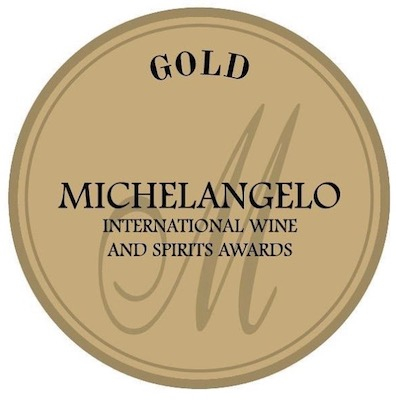 There's so many great moments. When I was drinking wine with my grandmother. Nothing beats that one. For me that was my moment of life. But also, I think my very first award, and when I got the gold medal. That was again an eye opener for me, because we went to the awards function, and to get into the hall and you see that there's only two black people who are here at the function, and the rest of the black people we are seeing are the waiters and waitresses. But at that moment I didn't know that they knew that I existed. But immediately when my wine was called, all the waiters and waitresses screamed with excitement, and I was like "Oh my word." There was that moment. So I like literally, I stood up and I ran to them at the end and asked them to get together. And then I went back and picked up my medal. It was fantastic, it was amazing.
There's so many great moments. When I was drinking wine with my grandmother. Nothing beats that one. For me that was my moment of life. But also, I think my very first award, and when I got the gold medal. That was again an eye opener for me, because we went to the awards function, and to get into the hall and you see that there's only two black people who are here at the function, and the rest of the black people we are seeing are the waiters and waitresses. But at that moment I didn't know that they knew that I existed. But immediately when my wine was called, all the waiters and waitresses screamed with excitement, and I was like "Oh my word." There was that moment. So I like literally, I stood up and I ran to them at the end and asked them to get together. And then I went back and picked up my medal. It was fantastic, it was amazing.
What else? Oh yeah, when I was crowned woman winemaker of the year in 2009.
That's gotta be big. Really. That’s gotta be big.
It's big, but still doesn't beat my grandmother.
That's the thing. But yes, when I was crowned woman winemaker of the year it was also one of the big moments. One of the biggest moments. That's what I'm saying: there's a lot. There's that, and there's also been a lot of little recognition outside, which has been fantastic. And knowing that my wine actually ... that I go out to the world and enjoy a glass of wine with people somewhere in another country. Like I'm here in the States, I've been basically on a tour of different states. And going to Japan, having my wines in Japan. When I went to Japan I was scared actually. Because of the culture and ... I know they're drinking my wine, but ... you know, it was fantastic. It was fantastic.
